BusinessEurope Headlines No. 2023-10
Improving investment conditions to strengthen Europe’s competitiveness
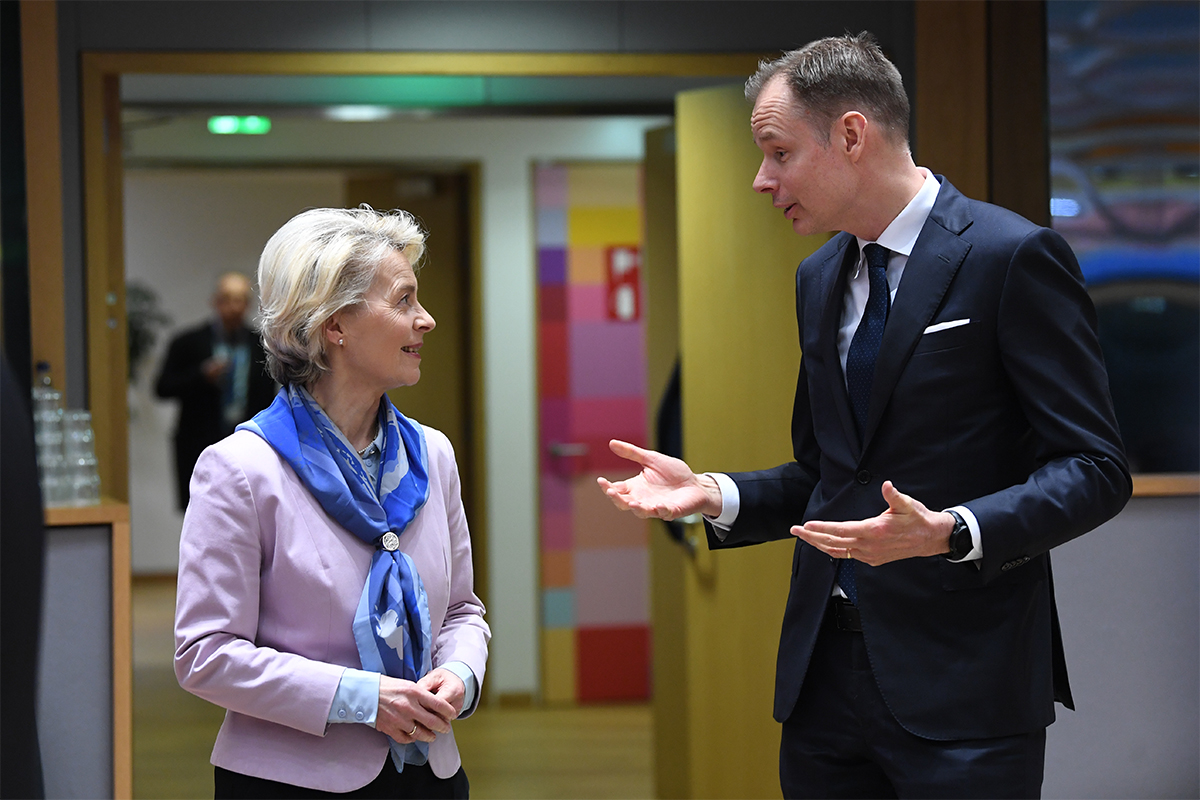
Speaking at the Tripartite Social Summit meeting on 22 March, BusinessEurope President Fredrik Persson highlighted that high energy prices and regulatory burdens are pushing investment away from Europe. European leaders urgently need to improve investment conditions in the EU to strengthen the competitiveness of European enterprises. Four key ingredients need to be included in this strategy: 1. less and better quality legislation; 2. secure energy supply at competitive prices; 3. a broad industrial strategy flanking the Green Deal; 4. well calibrated state aid rules. “The European Commission must live up to its commitments to do competitiveness checks and reduce reporting requirements for all companies by 25%. The answer to Europe's competitiveness challenges cannot be to engage in a subsidy race”, Persson said. State aid, he added, should remain temporary and needs to be carefully calibrated to preserve the level playing field in the Single Market. Persson also stated that the decarbonisation of Europe is a priority for the whole economy and the limited scope of the Net-zero Industry Act risks becoming a handicap for Europe’s transformation. “A much broader industrial strategy is required. And public authorities must work with the social partners to address the skills gaps which are undermining our competitiveness”, he concluded. Read his full speech.
![]() Contact: Maxime Cerutti
Contact: Maxime Cerutti
Photo © European Union, 2023
Reform Barometer: EU’s global competitiveness under threat
The EU has become less attractive to investors in the past 3 years – say 90% of our member federations in our latest Reform Barometer. Watch our Chief Economist James Watson explain and read our survey.
How to improve the EU “SME Test”
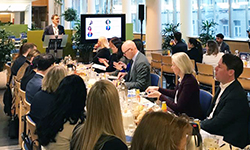 BusinessEurope, Eurochambres and SMEunited on 21 March co-hosted with the SME Intergroup of the European Parliament a breakfast debate to discuss the key findings of their joint report “SME Test benchmark”. BusinessEurope Deputy Director General Alexandre Affre stressed that “the conclusions of our work provide a mixed picture. While better regulation principles have been growing in importance, the SME Test guidelines are still not applied consistently by all Commission services. We therefore call on the European Commission to apply this key better regulation tool appropriately”.
BusinessEurope, Eurochambres and SMEunited on 21 March co-hosted with the SME Intergroup of the European Parliament a breakfast debate to discuss the key findings of their joint report “SME Test benchmark”. BusinessEurope Deputy Director General Alexandre Affre stressed that “the conclusions of our work provide a mixed picture. While better regulation principles have been growing in importance, the SME Test guidelines are still not applied consistently by all Commission services. We therefore call on the European Commission to apply this key better regulation tool appropriately”.
During the discussion, the role as co-legislators of the European Parliament and Council to support SME-proofed regulatory regime and the application of the SME Test, was also underlined. The debate featured the participation of the Intergroup co-chairs MEP Angelika Winzig and MEP Martina Dlabajova, as well as MEP Jörgen Warborn and the member of Cabinet of European Commission’s Vice-President Maroš Šefčovič, Carsten Schierenbeck. Other Members of the European Parliament and the European Commission and SME representatives were also present. Affre stressed that for new policies and regulations, it is key to consider cumulative compliance. This is particularly needed at a time when excess of regulations, especially due to new cumulative environmental, social and governance regulations and reporting requirements, are putting companies under severe pressure.
The joint report prepared by the three business associations analyses the application of the European Commission SME Test, assesses its use across Commission services and provides recommendations for better SME policy making. Twenty-six impact assessments have been checked against the Commission’s own better regulation guidelines to assess whether and to what extent the SME Test, a mandatory tool in ensuring an SME-proofed regulatory regime, is carried out. Based on their analysis, the report proposes several recommendations to ensure that the Better Regulation approach leads indeed to a better regulatory framework for SMEs. The full report is available here.
![]() Contact: Daniele Olivieri
Contact: Daniele Olivieri
Türkiye earthquakes: coordinated and well-targeted international support is key
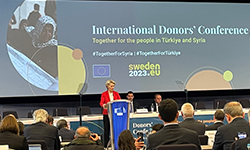 Ahead of the International Donors’ Conference organised by the EU on 20 March, BusinessEurope sent a letter to the President of the European Commission Ursula von der Leyen reaffirming the solidarity and cooperation of European business with the Turkish business community. According to available information only for Türkiye, where the earthquakes directly impacted more than 15 million people, it is estimated that recovery and reconstruction will amount to 81.5 billion dollars with loss estimated at 22.1 billion dollars. In view of the damage extent, BusinessEurope calls for jointly coordinated, multi-disciplined and multi-stakeholder actions and support, both in terms of responding to immediate humanitarian needs and reconstruction efforts. Well-targeted financial support in line with green and digital transition goals to ensure sustainable and transformative reconstruction of the region will be key.
Ahead of the International Donors’ Conference organised by the EU on 20 March, BusinessEurope sent a letter to the President of the European Commission Ursula von der Leyen reaffirming the solidarity and cooperation of European business with the Turkish business community. According to available information only for Türkiye, where the earthquakes directly impacted more than 15 million people, it is estimated that recovery and reconstruction will amount to 81.5 billion dollars with loss estimated at 22.1 billion dollars. In view of the damage extent, BusinessEurope calls for jointly coordinated, multi-disciplined and multi-stakeholder actions and support, both in terms of responding to immediate humanitarian needs and reconstruction efforts. Well-targeted financial support in line with green and digital transition goals to ensure sustainable and transformative reconstruction of the region will be key.
![]() Contact: Luisa Santos
Contact: Luisa Santos
Industrial Emissions Directive discussed in the European Parliament
 “The current Industrial Emissions Directive (IED) is not broken, it works and is delivering results. Industrial emissions in Europe are going down”, said Alexandre Affre, BusinessEurope Deputy Director General, at a webinar on 21 March hosted by the Member of the European Parliament Michal Wiezik, shadow rapporteur for the revision of the directive in the Committee on Environment, Public Health and Food Safety. Affre raised some of the risks which have not been sufficiently considered with the proposed revision. For instance, the increased number of overlaps between the IED and other EU legislations, creating legal uncertainties and additional regulatory burden without clear environmental benefits. He also cited the risk of prolonging permits-granting process and delaying the transformation of industries, and the risk of certain provisions on setting “emissions limit values”, not reflecting the technical reality and feasibility of industrial plants.
“The current Industrial Emissions Directive (IED) is not broken, it works and is delivering results. Industrial emissions in Europe are going down”, said Alexandre Affre, BusinessEurope Deputy Director General, at a webinar on 21 March hosted by the Member of the European Parliament Michal Wiezik, shadow rapporteur for the revision of the directive in the Committee on Environment, Public Health and Food Safety. Affre raised some of the risks which have not been sufficiently considered with the proposed revision. For instance, the increased number of overlaps between the IED and other EU legislations, creating legal uncertainties and additional regulatory burden without clear environmental benefits. He also cited the risk of prolonging permits-granting process and delaying the transformation of industries, and the risk of certain provisions on setting “emissions limit values”, not reflecting the technical reality and feasibility of industrial plants.
Contact: Viktoria Bartolome
Exchange on Single Market and digitalisation initiatives in Prague
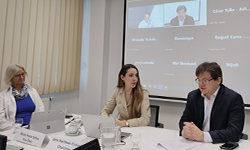 The Confederation of Industry of the Czech Republic hosted a meeting of BusinessEurope’s Internal Market Committee in Prague on 16 March. The discussion focused on the latest developments in the Single Market and digitalisation policies. The committee took stock of the state of play in negotiations on the Single Market Emergency Instrument (SMEI) and the European Commission’s publication of the Annual Single Market Report, the Single Market Scoreboard and the recently published communication on the 30th anniversary of the Single Market.
The Confederation of Industry of the Czech Republic hosted a meeting of BusinessEurope’s Internal Market Committee in Prague on 16 March. The discussion focused on the latest developments in the Single Market and digitalisation policies. The committee took stock of the state of play in negotiations on the Single Market Emergency Instrument (SMEI) and the European Commission’s publication of the Annual Single Market Report, the Single Market Scoreboard and the recently published communication on the 30th anniversary of the Single Market.
A separate in-depth discussion on the digital EU legislative landscape and technological sovereignty, as a re-emerging topic in the context of “techno-political competition” and geopolitical challenges, was also held. The aim was to define the business community line on how to approach the policies on Europe’s competitiveness and aid digitalisation.
The committee members agreed that a more assertive strategic decision-making to reduce Europe’s vulnerabilities and maintaining trusted relationship with key trading partners across the globe were necessary.
Petr Očko, Deputy Minister for Digitalisation and Innovation at the Czech Ministry of Industry and Trade, as well as Martin Bednář, Director of the Ministry’s Department of European Affairs and the Internal Market, were invited to discuss the experiences of the recent Czech EU Council Presidency.
Contact: Martynas Barysas
Challenges to the global trading system: conversation with WTO Director-General
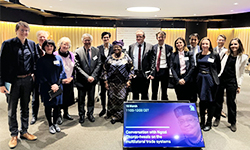 The 12th World Trade Organisation (WTO) Ministerial Conference (MC12), how global institutions should function in a fragmented and geopolitical world, the green transition and the path towards a meaningful MC13 were the main topics discussed with Ngozi Okonjo-Iweala, WTO Director-General, at a stakeholders meeting organised by Bruegel on 16 March. Ngozi highlighted that a rules-based international order is more important than ever, given the increasing geopolitical tensions, and that MC12 had very positive results despite the low expectations. She also underlined that trade is part of the solution to climate change and can help countries reduce emissions by increasing the availability and affordability of environmental goods, services and technologies. She strongly believes that the world needs to price carbon, and stated that the WTO is working intensively to coordinate approaches and avoid fragmentation as decarbonisation standards and different measures such as a Carbon Border Adjustment Mechanism proliferate. Elena Suárez, Senior Adviser at BusinessEurope, pointed out that BusinessEurope continues to strongly support a reform at the WTO. This organisation remains very important for European businesses, given that 60% of EU trade is conducted on most favoured nation' basis, including with some of our major trading partners i.e. the United States and China.
The 12th World Trade Organisation (WTO) Ministerial Conference (MC12), how global institutions should function in a fragmented and geopolitical world, the green transition and the path towards a meaningful MC13 were the main topics discussed with Ngozi Okonjo-Iweala, WTO Director-General, at a stakeholders meeting organised by Bruegel on 16 March. Ngozi highlighted that a rules-based international order is more important than ever, given the increasing geopolitical tensions, and that MC12 had very positive results despite the low expectations. She also underlined that trade is part of the solution to climate change and can help countries reduce emissions by increasing the availability and affordability of environmental goods, services and technologies. She strongly believes that the world needs to price carbon, and stated that the WTO is working intensively to coordinate approaches and avoid fragmentation as decarbonisation standards and different measures such as a Carbon Border Adjustment Mechanism proliferate. Elena Suárez, Senior Adviser at BusinessEurope, pointed out that BusinessEurope continues to strongly support a reform at the WTO. This organisation remains very important for European businesses, given that 60% of EU trade is conducted on most favoured nation' basis, including with some of our major trading partners i.e. the United States and China.
Contact: Elena Suárez
Calendar 
- 5 April: WIPO-BusinessEurope Workshop: Exploring the future of innovation-driven growth and the role of intellectual property
- 18 April: VAT in the digital age: digital / real-time reporting - Implications for businesses and compliance processes
- 6 June: Reuters Event: Responsible Business Europe 2023
- 14-15 June: International IP Enforcement Summit
- 19-20 June: TDI23 – Day of Industry
Not yet a subscriber? Register here.
Reminder: please have a look at our privacy policy